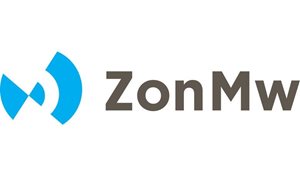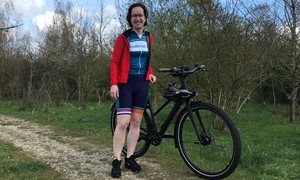
A special action by colleague Marleen van Gelder, assistant professor in the Department of Health Evidence. In exactly two months' time, she will be getting on her bicycle to draw attention - and especially money - to research into premature births. Just a bike ride? No, a 2,000-kilometer "ride." To Norway. And back! 'I'm already training, building up more fitness, seat meat and mileage each week.'
Marleen, why are you going to bike so far?
'As a researcher I work a lot with foreign colleagues. Only together can we properly identify the causes of preterm birth. When I was invited for a two-week working visit to the University of Oslo, Norway, I thought: I'm going to turn this into a sponsored trip. And the knife cuts on three sides: first of all I hope to raise money for the Amalia Children's Fund, because unfortunately there is no specific fund for scientific research on preterm birth. In addition, the trip is also good for my condition and better for the climate than if I would step on a plane.
Why should premature births be better researched?
Unfortunately, a delivery before 37 weeks is common. In the Netherlands, it happens to 1 out of 14 babies. They then need extra medical care because they are not yet fully grown. Despite this care, premature birth is the biggest cause of death among children in the Netherlands.
In addition, many babies are left with permanent problems from premature birth, such as a physical disability or developmental delay. All this has not only a major impact on the children themselves, but also - often long-term - on their parents and other family members.
The cause of most premature births is unknown. With more knowledge about causes and biological mechanisms of preterm birth, we can develop solutions to prevent preterm birth.'
What is the bike-trip going to be like?
'Monday, June 13, I get on my bike, and I cycle stages of 135 to 160 kilometers - which means I'm on my bike for pretty much a whole workday. In Frederikshavn (North Denmark) I take the boat to Oslo. After the working visit to the University of Oslo, where I will be working with researchers from the Department of Pharmacy on a large European project, I get on the boat again on July 2. First a bit through Norway itself, crossing the Skagerrak by boat and then cycling back through Denmark - a slightly different route, because there has to be some variety - home.'
And, are you looking forward to it?
'Despite the fact that it's quite a challenge, I'm certainly looking forward to it; I do enjoy cycling, of course. I have managed to get hold of a good trekking bicycle and am already building up the kilometers on it. For example, I cycle to the Radboudumc, which is over 20 kilometers from my home. But I also cycle to visit colleagues for a cup of tea. The nice thing is that some colleagues have offered to cycle with me for a day during the trip. Of course, they will come by train - otherwise we would immediately kill the climate objective ...
All in all, I do hope that the weather will be kind to me. That I don't get eight hours of head wind and rain in one day.
Want to stay up to date on Marleen's journey?
At www.fietsentegenvroeggeboorte.nl Marleen keeps us informed about her preparations and the trip itself. You can also follow her on Twitter: @MarleenvGelder
Related news items
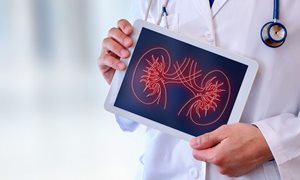
Body composition is more important than BMI for renal cancer survival rates
11 January 2022 Body composition is important for survival rates in renal cell cancer. Research from the Radboudumc shows that low muscle quality and low organ fat are associated with poor survival. This involves different stages of renal cancer, ranging from stage I-III to stage IV. go to page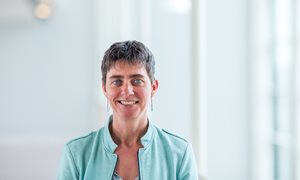
Mireille Broeders appointed member of the Dutch Health Council
16 November 2021 Mireille Broeders, professor of Personalized Cancer Screening, has been appointed as a member of the permanent Committee on Population Screening of the Dutch Health Council (Gezondheidsraad). go to page
Epidemiology and reporting characteristics of preclinical systematic reviews in PLoS Biology
7 June 2021 Kim Wever, researcher of the department of Health Evidence and an international team published the article 'Epidemiology and reporting characteristics of preclinical systematic reviews' in PLoS Biology. go to page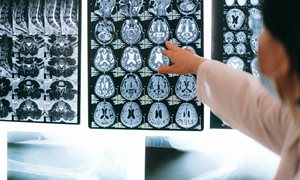
Millions of euros for study of laser treatment for glioblastoma
2 April 2021 A research group from Radboudumc and UMC Utrecht is to investigate laser treatment of a rare brain tumor, glioblastoma. 3.9 million euros has been made available for the research by Zorginstituut Nederland and ZonMw, under the auspices of the Subsidy Scheme for Promising Care. go to page
Differences in the placental disposition of TNF inhibitors uncovered
19 March 2020 In Clinical Pharmacology and Therapeutics, researchers from the Depts. of Pharmacology and Toxicology, Obstetrics and Gynecology, and Health Evidence, in collaboration with Sanquin Diagnostic Services, investigated the placental handling of the TNF inhibitors infliximab and etanercept. go to page